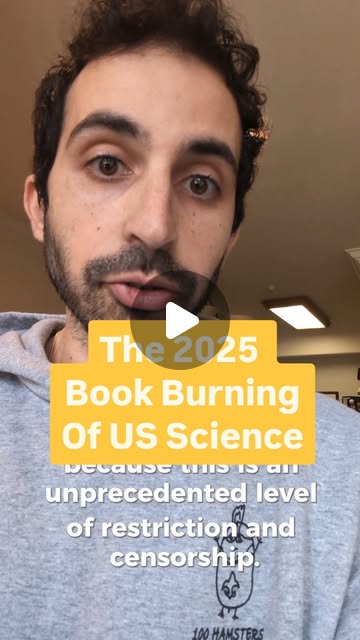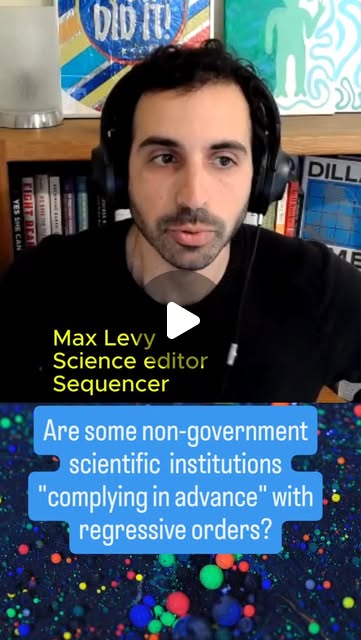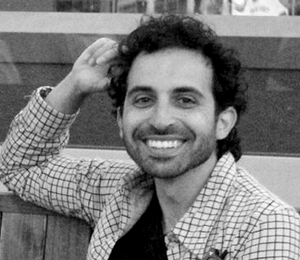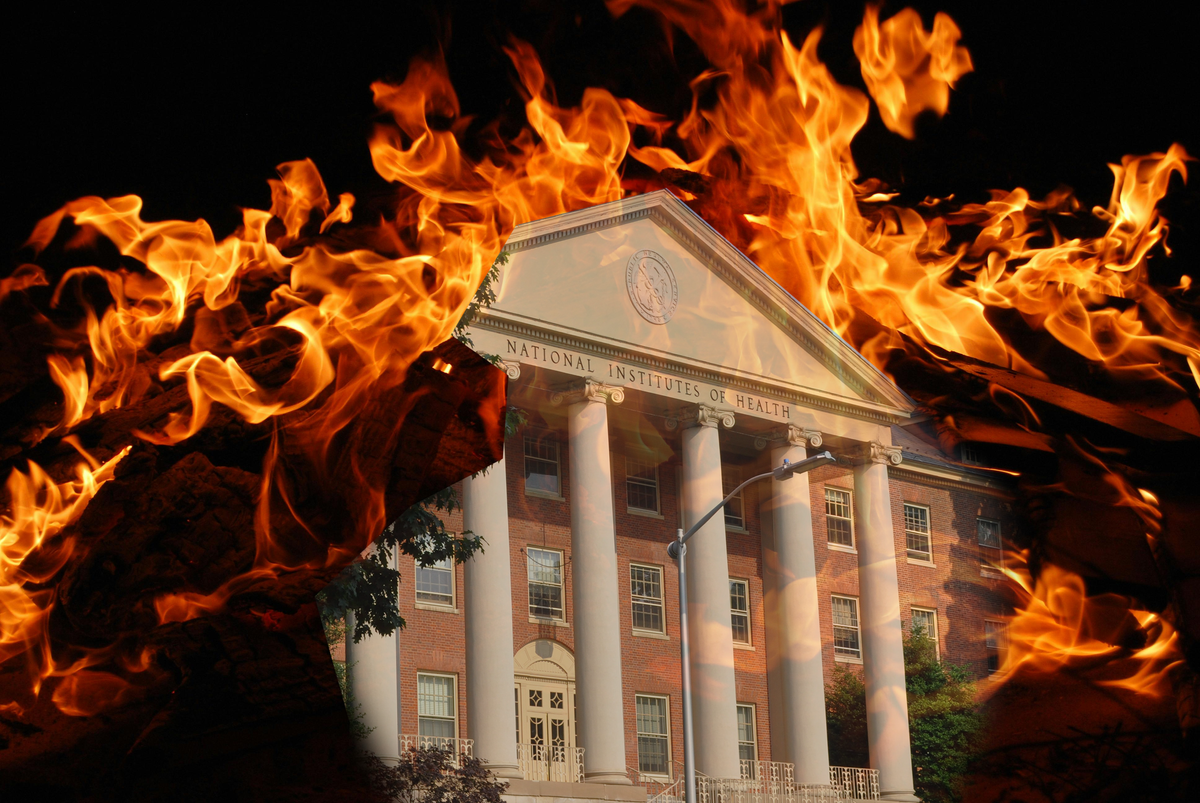The Trump administration’s assault on research institutions threatens countless people’s livelihoods and security at all levels of the country’s scientific enterprise. Non-government researchers, students, professors, postdoctoral fellows, and even researchers funded by private foundations — all face radical changes to their careers and risk indefinite detours to their life’s work.
I recently caught up with Max Kozlov, a science reporter at Nature who has been all over these regressive policies. We spoke about an important distinction between public and private institutions, compliance, resistance, and his experience reporting on the crisis.
The following is a transcript of our conversation edited for clarity.
Sequencer: What has it been like in the Nature newsroom these days?
Kozlov: It's been difficult to keep up with the deluge of all the news that's coming out. Our US team is pretty small. We have about four or five full-time reporters, and they're all wonderful but it does mean that we can't do every single story. We have to pick and choose what's most important to scientists and to our readership.
I'm a young journalist. I partially became a reporter because of the first Trump administration, wanting to contribute in reporting and how science is covered. I hadn't really experienced that urgency in the last few years, but in the last three weeks it's definitely been reawakened.
"What has been really scary, I think, is people who aren't even at a federal agency, who aren't even at a public university — people at private universities — even they have been reluctant to talk to me. Everybody is really, really scared about drawing any kind of attention to their name, to their research, to their university."
What are scientists telling you about their feelings right now?
They're very confused, because I think a lot of the decisions are being made far above them, even folks who are high up in these agencies. Even talking about this indirect costs policy [which slashed vital research overhead costs on NIH grants] that was released at like 6pm on Friday, I think that caught everybody off guard. The funding freeze that was going to stop all federal grants, that caught everybody off guard. There's not really great communication, I think, from leadership to agency staff. It's been encouraging to see that people want to talk, because there's kind of this culture of fear that's been created about talking to other federal employees and definitely talking to members of the media.
That means we have a real service that we can do to try to kind of connect these different dots — to kind of cut through all of the noise right now.

We’ve been thinking about this “culture of fear” you mentioned. Are you sensing an appetite for resistance?
It's certainly different from the first Trump administration, when there was a very loud and clear resistance, I think. It's partly people that are fatigued right now; and partly it's just that the Trump administration is moving much, much, much faster this time around.
But what has been really scary, I think, is people who aren't even at a federal agency, who aren't even at a public university — people at private universities — even they have been reluctant to talk to me. Everybody is really, really scared about drawing any kind of attention to their name, to their research, to their university.

I'll give you one specific example. I was working on a story about the funding freeze at NSF and how their payment portal — where, if you're a P.I. or any kind of researcher, you can take out your allocated research grant money — that went down. That’s frustrating for a lot of people, given that it's already allocated money, but especially frustrating to this group of early career researchers through postdoc programs that get their entire salary from the NSF. They couldn't in some cases afford to pay rent and get groceries. I mean, it's their salary, right?
These are awful stories. And people need to hear these kinds of stories. But even some of those researchers were reluctant to go on the record because their universities were kind of pressuring them to maybe not speak with the media. And that's kind of, to me, crazy because these are private universities who should be taking their students’ side. It's 100% in their benefit for these researchers to be paid on time. But it just goes to show that no university wants to put a target on their back right now, and that's definitely something I haven't seen before.
You bring up a good point with this public–private distinction. You wrote recently about HHMI [a private science foundation that doesn't receive federal money] canceling a $60 million diversity initiative and scrubbing any mention of it. I fear that some organizations don’t even need to be coerced.
They gave no reason for their cancellation. But I think that researchers are very sensitive to this right now, so even if it was totally unrelated, the fact that this comes just weeks after the crackdown on anything DEI related in the federal government — researchers certainly took note of that. And people are especially sensitive right now about taking down websites.
A lot of people expected, funding is drying up — the federal funding landscape will look totally different — people maybe had predicted that even before the Trump administration took office. But I think they were shocked by how quickly some organizations are complying in advance.
It hurt a lot of people in the scientific community, because in 2020 a lot of these same organizations talked a big game about how they would support early career researchers and underrepresented voices in scientific research. And so to turn their backs just a few years later, I think people are pretty frustrated by that. [HHMI took down an entire landing page to its DEI commitment.]
Do you feel like this is an emergency? Are you getting this sense from the people you speak with that there's an urgent need for resistance against these policies?
What we've seen so far in the last three weeks is unprecedented in so many different ways. Trump really does appear to be pushing the boundaries of executive power. I think that's a trend that has emerged. It's not not business as usual. At stake is our entire research enterprise.
We've been talking about this in the newsroom as well. I don't cover climate science, so I can't speak to this specifically, but we've noticed that people in general would tend to like to see solutions or ways to look past the existential threat of climate change. How can we tangibly improve our situation? In my reporting, I've been trying to point to examples of people organizing and mobilizing for some of the actions that have been taken so far.
"I think they were shocked by how quickly some organizations are complying in advance."
What's an example of that?
With the funding freeze on federal grants and foreign aid, there was a rally of scientists at the White House, and a rally to call your congressional representatives to take action. These actions aren't necessarily a given. People do have ways that they can voice their concerns should they have them.
How do you feel about how science media is covering this so far?
My colleagues and fellow science journalists have been hard at work because of this fire hose of stuff. So I've been impressed in that regard. I think that it'll be interesting to see some kind of, you know, “one month later” analysis. We need to take a step back and think about what this first month signals about the Trump administration.
I'm glad that people are talking about our reporting, but I've been doing a lot of yoga to compensate. I'm tired, but I am more eager than ever to do what I do.








